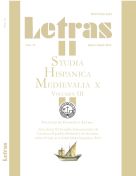Por favor, use este identificador para citar o enlazar este ítem:
https://repositorio.uca.edu.ar/handle/123456789/3876| Campo DC | Valor | Lengua/Idioma |
|---|---|---|
| dc.contributor.author | Albornoz, Diana Leila | es |
| dc.coverage.spatial | España | es |
| dc.date.accessioned | 2019-06-01T18:07:28Z | - |
| dc.date.available | 2019-06-01T18:07:28Z | - |
| dc.date.issued | 2016 | - |
| dc.identifier.citation | Albornoz, Diana. “Problemas en torno a la utilización del término “ley” en el Setenario alfonsí y su relación con el propósito del libro” [en línea]. Letras, 73 (2016). Disponible en: https://repositorio.uca.edu.ar/handle/123456789/3876 | es |
| dc.identifier.issn | 0326-3363 | - |
| dc.identifier.uri | https://repositorio.uca.edu.ar/handle/123456789/3876 | - |
| dc.description.abstract | Resumen: Reputado como un texto jurídico supeditado a la Partida I, el Setenario de Alfonso X fue considerado por la crítica —y por Kenneth Vanderford, su único editor— como un mero borrador del célebre código alfonsí. En este trabajo se analiza la relación entre el propósito del texto y la materia filosófica, astrológica y religiosa que en él se organiza, relación que pone de manifiesto una intención persuasiva que no se encuentra en la Partida I: el Setenario pretende brindar los argumentos necesarios para probar que la fe católica es la verdadera sin el auxilio de las Sagradas Escrituras. En consonancia con dicho propósito, el término “ley” se carga de un sentido religioso más que jurídico, lo que otorga coherencia al texto al tiempo que lo distingue del cuerpo de las Partidas. | es |
| dc.description.abstract | Abstract: Being considered a legislative text subordinated to the Partida I, theorists as well as its only editor have taken the Setenario of Alfonso X the Wise as a mere draft of the famous Alfonsine Codex. The present paper will analyze the relationship between the purpose of the text and the philosophical, astrological, and religious matter organized in it. This relationship unveils a persuasive intention completely absent in the Partida I: The Setenario claims to provide the necessary arguments for the proof of the truth of the Catholic Faith without referring to the Holy Scriptures. According to this claim, the term of “ley” [law] is charged with a religious rather than legal sense. This conclusion underlines the coherence of the text, distinguishing it from the Partidas. | es |
| dc.format | application/pdf | es |
| dc.language.iso | spa | es |
| dc.publisher | Universidad Católica Argentina. Facultad de Filosofía y Letras | es |
| dc.rights | Acceso Abierto | es |
| dc.rights.uri | https://creativecommons.org/licenses/by-nc-sa/4.0/ | es |
| dc.source | Letras Nº 73, 2016 | es |
| dc.subject | CODIGOS | es |
| dc.subject | SIETE PARTIDAS | es |
| dc.subject | ANALISIS LITERARIO | es |
| dc.subject | RELIGION | es |
| dc.subject | FILOSOFIA | es |
| dc.subject | Alfonso X, Rey de Castilla y Leon, 1221-1284 | es |
| dc.title | Problemas en torno a la utilización del término “ley” en el Setenario alfonsí y su relación con el propósito del libro | es |
| dc.title | Problems about the utilization of the world "ley" in alfonsine Setenario and its relationship with the purpose of the book | es |
| dc.type | Artículo | es |
| uca.path | Letras|2016 nº 73 | es |
| uca.disciplina | LITERATURA | es |
| uca.filename | /home/data-uca-generic/folder_generic/letras73/problemas-utilizacion-termino-ley/metadata.xml | es |
| uca.issnrd | 1 | es |
| uca.affiliation | Fil: Albornoz, Diana Leila. Universidad de Buenos Aires; Argentina | es |
| uca.orden | 04 | es |
| uca.version | publishedVersion | es |
| item.languageiso639-1 | es | - |
| item.grantfulltext | open | - |
| item.fulltext | With Fulltext | - |
| Aparece en las colecciones: | LETRAS - 2016 nro. 73 | |
Ficheros en este ítem:
| Fichero | Descripción | Tamaño | Formato | |
|---|---|---|---|---|
| problemas-utilizacion-termino-ley.pdf | 71,05 kB | Adobe PDF |  Visualizar/Abrir |
Visualizaciones de página(s)
104
comprobado en 30-abr-2024
Descarga(s)
51
comprobado en 30-abr-2024
Google ScholarTM
Ver en Google Scholar
Este ítem está sujeto a una Licencia Creative Commons

